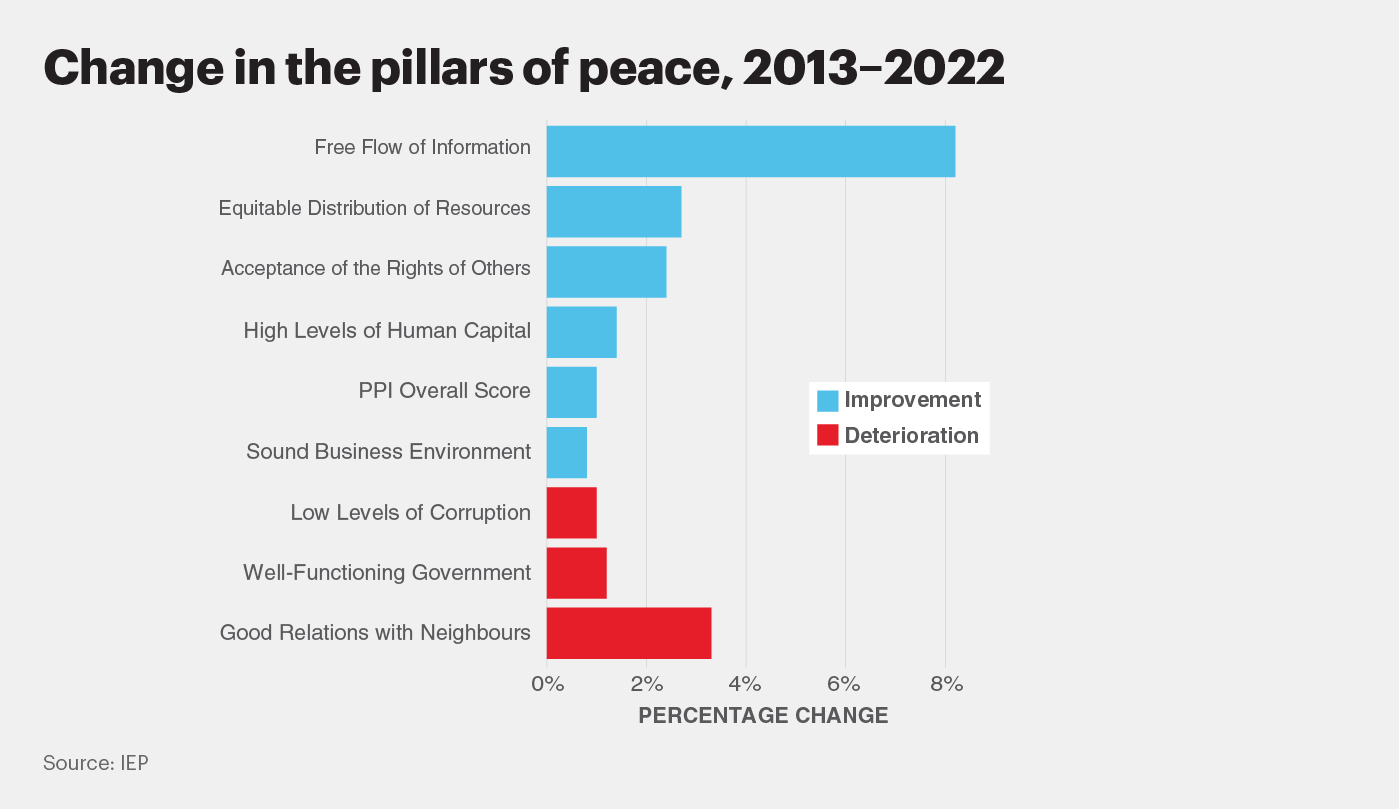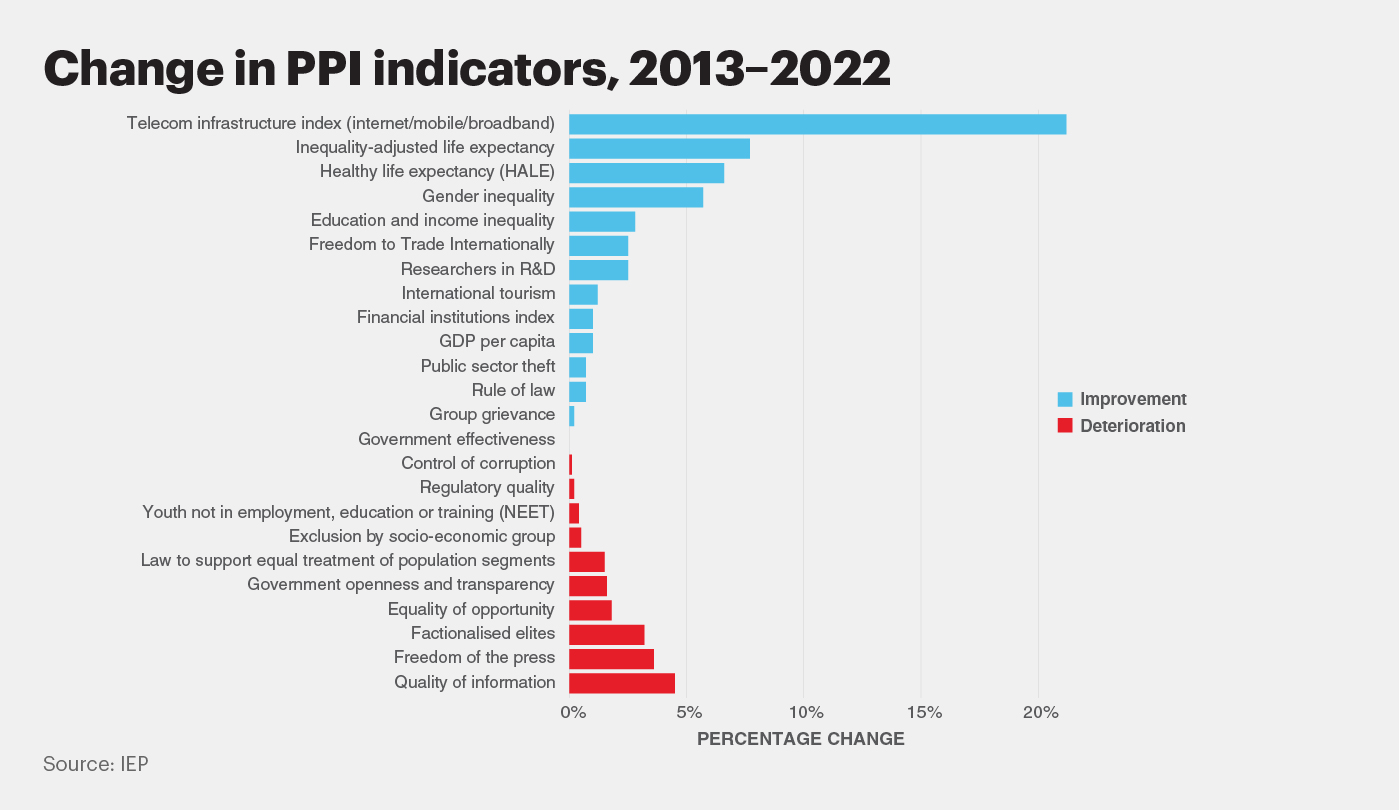Trust in media sources has fallen, with more than 56 per cent of people saying they worry about identifying the difference between real and fake news on the internet, according to Reuters. Resolving this uncertainty in journalistic integrity requires the operation of a free and transparent press that informs and educates the public using credible information developed and disseminated without external interference.
This World Press Freedom Day, we remember how the establishment and maintenance of a free press is crucial for Positive Peace to flourish, as evidenced by emerging research from the 2024 Positive Peace Report (PPR).
The Free Flow of Information Pillar is a crucial part of IEP’s Positive Peace Framework. Comprised of eight key pillars, Positive Peace is necessary to sustain long-lasting and stable peace in societies. The pillars work in tandem to uphold the attitudes, structures and institutions that allow societies to flourish, and include a Well-Functioning Government; Equitable Distribution of Resources; Free Flow of Information; Good Relations with Neighbours; High Levels of Human Capital; Acceptance of the Rights of Others; Low Levels of Corruption; Sound Business Environment.
Safeguarding individuals’ right to make better, informed decisions leads to better outcomes and more rational responses in time of crisis. A free and independent media allows this process to take place by disseminating information in a way that leads to greater knowledge and thus more informed decision-making.
Positive strides have been made this year with regards to the Free Flow of Information, with it being recorded as the most improved Positive Peace pillar in the 2024 PPR, with a more than eight per cent increase because of increased global access to technology. This improvement matches trends over the past decade, with the Free Flow of Information rising drastically in comparison to other Pillars of Peace. Research from this year’s PPR developed by the Institute for Economics & Peace (IEP) finds that Free Flow of Information also increases countries’ income and economic growth. In fact, countries that improved in levels of Positive Peace recorded a boost in economic output of 59 per cent as opposed to a boost of only 27 per cent in countries whose levels deteriorated.

Despite this, recent attacks against the freedom of the press have threatened to undercut this progress. The 2023 World Press Freedom Index found that the environment for journalism is “bad” in 7 out of 10 countries, a volatility that’s been heightened by the pernicious effects of the fake content industry. From disinformation spread in propaganda campaigns to tampered-with photos and images, the proliferation of falsified content has made it harder for both individuals and journalists to identify potentially misleading material.
The distinction between disinformation and misinformation lies in intent; while disinformation is purposefully falsified to intentionally mislead, misinformation is misleading due to false claims or non-credible sources. Regardless, both pose a threat to the future of journalism as AI technology continues to evolve and improve.
To combat the spread of disinformation and misinformation, it remains a key responsibility for social media and news platforms to maintain transparency around their practices of content production and moderation. As well, in order for journalistic practices to remain independent and trustworthy, the international press needs to ensure that they remain judicious in their fact-checking practices to ensure that misleading or biased content is filtered out.
Concerningly, the freedom of the press has deteriorated by almost 5 per cent from 2013 to 2022. Meanwhile, another structure in the Free Flow of Information, telecom infrastructure index, improved drastically. The difference in the two structures, which both support the same Positive Peace pillar, reveals how improvements in access to information does not necessarily result in improved freedom of expression for print, broadcast and internet journalists.

Regions that have been recently affected by a lack of a free press include the European Union, which reported a sizeable 29.8 per cent deterioration in the past year, as well as Russia and India, both of whom recorded a nearly 10 per cent decrease. The countries with the lowest levels of Press Freedom are currently all located in Asia, with Vietnam ranking 178th, followed by China (the world’s largest jailer of journalists) and North Korea ranking last.
With the prevalence of threats to the freedom and safety of press on the rise globally, it remains more important than ever to safeguard the rights of journalists and protect their ability to investigate and disseminate information without interference.